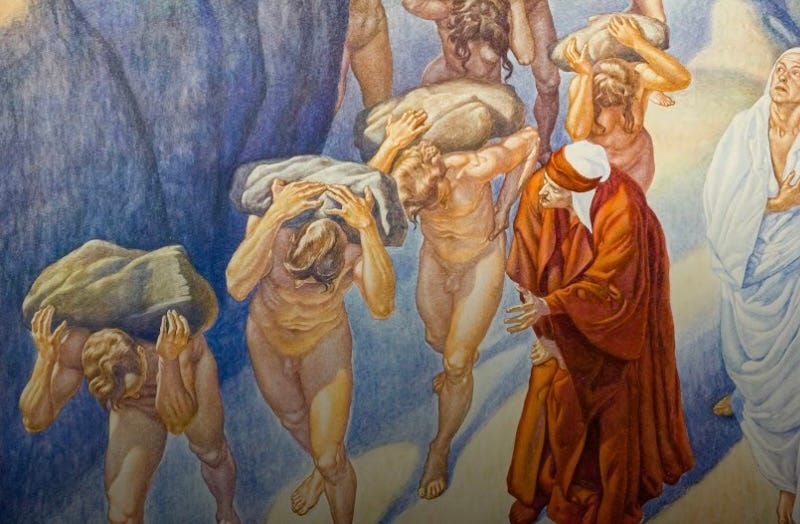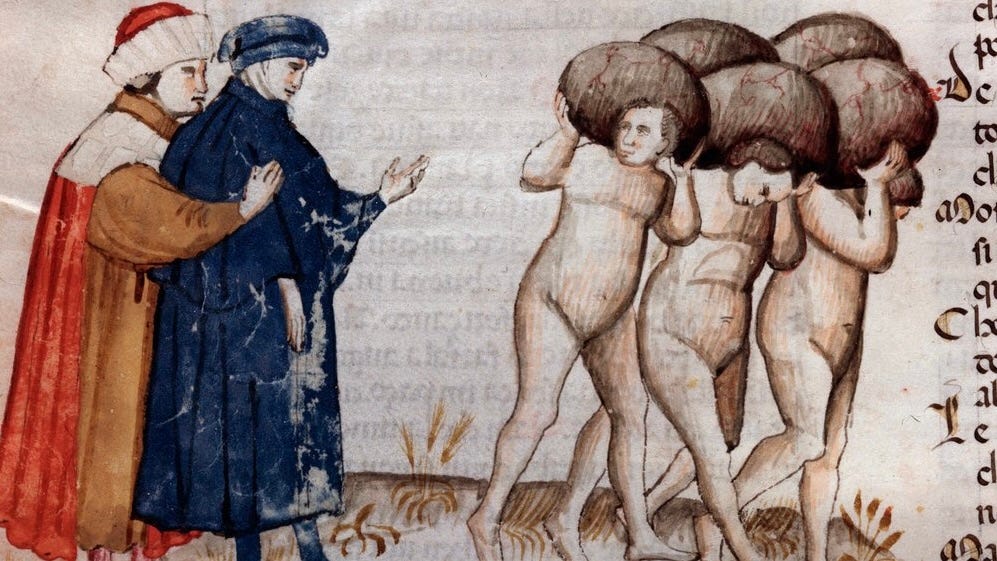How to Defeat Pride
According to Dante's Divine Comedy
Previously, we covered the Mountain of Purgatory as portrayed in Dante’s Purgatorio, the second installment of his three-part Divine Comedy. As you might remember, it is a 10-tiered mountain, and each of the middle seven terraces corresponds to one of the seven deadly sins.
During his ascent up the mountain, Dante converses with souls on each terrace to learn about the nature of each deadly sin and, more importantly, how to overcome it. Mount Purgatory is structured so that the toughest sins to conquer are addressed first, and thus each progressive sin is easier to overcome than the one prior.
This means that the first main terrace of Purgatory is dedicated to rooting out the most difficult sin to overcome: pride. Today, we look at what Dante learns about the nature of this original, Satanic sin, as well as how to defeat it.
From conversations with Tuscan noblemen to images of the Virgin Mary, the emperor Trajan, and more, it’s a terrace that’s full of surprises, and revealing insight into the life of the soul…
Reminder: this is a teaser of our members-only deep dives.
To support our mission and get exclusive content every week, upgrade for just a few dollars per month. You’ll get:
New, full-length articles 2x per week
The entire archive of content (150+ articles, essays, and podcasts)
Membership to our bi-weekly book club (+ subscriber chat room)
Our book club is currently reading Tolkien’s The Fellowship of the Ring! The next discussion is on Wednesday, December 3, at noon ET — join us!
Weighed Down by Pride
They were indeed bent down—some less, some more—
according to the weights their backs now bore;
-Purgatorio Canto X, v.136-137
When Dante finally glimpses the souls on the first terrace of Purgatory, he can hardly believe his eyes. He struggles to make out what they are, before realizing that he’s seeing human beings bent down under the weight of massive boulders.
But lest you be misled into thinking this is some strange, Catholic form of torture, be sure you heed Dante’s words: Don’t dwell upon the form of punishment: / consider what comes after that (v.109-110). This is important because what’s happening on this terrace is not actually a punishment, but rather a means of teaching souls how to overcome the sin of pride.
The souls carry these boulders because doing so reflects the ways in which pride holds you back in life. On the one hand, the massive weight of the stone slows the souls down from reaching their destination: pride makes it harder to go where you want to go in life. On the other, the size of the boulder means souls can only carry it on their back, hunched over and looking at the ground — pride blinds them, and they can’t see where they’re going.
In portraying the souls in such a manner, Dante highlights the nature of the sin of pride: it holds you back, slows you down, and causes you to lose sight of the path you ought to be on. So how is it, then, that a prideful person ought to begin the quest to overcome pride?
Dante gets his first answer when he speaks with a particularly proud Tuscan nobleman…
The First Sparks of Humility
In Canto XI of Purgatorio, we encounter three different characters representing three kinds of pride: pride of birth, art, and power.
Omberto Aldobrandeschi is the man who embodies the first of these, and thus is the first soul on this terrace with whom Dante speaks. Struggling to communicate with the poet from underneath his boulder, Aldobrandeschi recounts the following:
I am Omberto; and my arrogance
has not harmed me alone, for it has drawn
all of my kin into calamity.
Until God has been satisfied, I bear
this burden here among the dead because
I did not bear this load among the living.
(Canto XI, v.67-72)
As the powerful leader of his noble family, Aldobrandeschi often let his pride get in the way of prudence. Notoriously fierce and eager to assert his dominance, Aldobrandeschi recklessly stoked the flames of interfamilial feuds, and eventually got murdered because of it. Pride therefore took not only his own life, but also greatly impoverished those of his family in his absence.
Because Aldobrandeschi could not bear the weight of humility during his earthly life, he must now learn how to do so in Purgatory. Part of his progress is glimpsed in one of the first lines he directs at Dante:
I was Italian, son of a great Tuscan:
my father was Guiglielmo Aldobrandesco;
I do not know if you have heard his name.
(Canto XI, v.58-60)
Here you can see the transformation of Aldobrandeschi’s soul playing out in real-time: he introduces himself by boasting of his father’s name, but then catches himself and adds “I do not know if you have heard his name.” It’s not perfect humility, and perhaps it feels a bit contrived — but nevertheless, it indicates that he is beginning to learn from his mistakes.
Dante’s interaction with Aldobrandeschi reveals not only how destructive pride can be, but also how to begin overcoming it. In the example above, we see that self-awareness plays a major role in doing so: but of course, it’s far from the only thing you need to overcome the Satanic sin.
The real key to triumphing over pride is found in the canto prior, where Dante hearkens back to a thousand-year-old meditative practice. At the same time, he predicts a technology that wouldn’t exist for 500 years…
Keep reading with a 7-day free trial
Subscribe to The Culturist to keep reading this post and get 7 days of free access to the full post archives.






